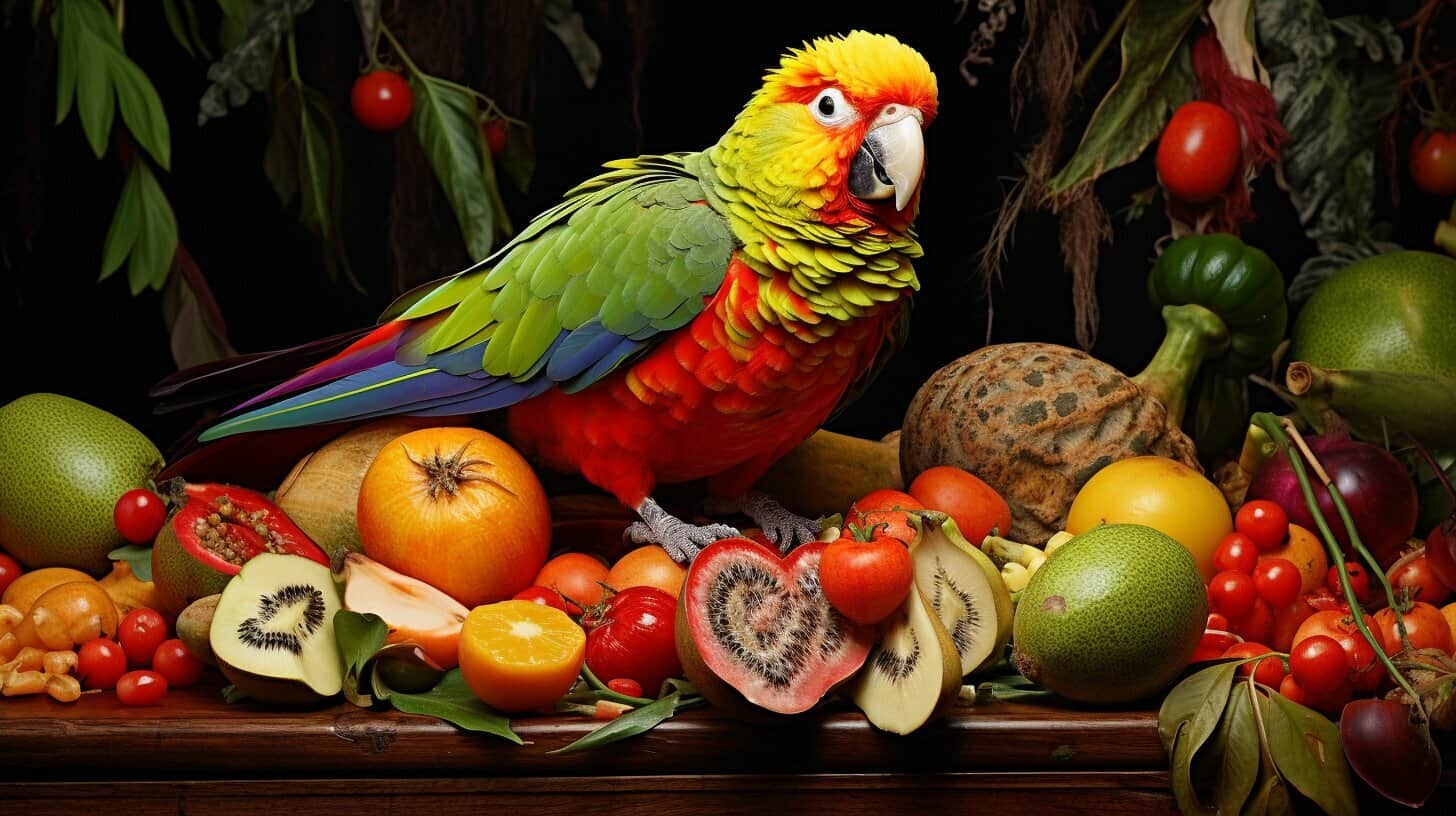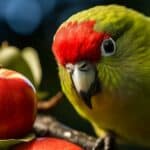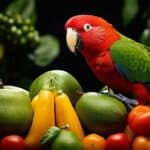Welcome to our ultimate bird nutrition guide, where we will explore whether kakarikis can safely consume bananas. Kakarikis are known for their playful and curious nature, and providing them with a nutritious diet is essential for their overall health and wellbeing.
Can kakarikis eat banana? Yes, kakarikis can eat banana. It is safe and healthy for them in moderation. Bananas provide essential vitamins and minerals for these parrots. Remember to remove any seeds or peels before offering the fruit to your kakariki.
Before we delve into the benefits and potential risks of including bananas in a kakariki’s diet, let’s first discuss their dietary needs. Understanding the nutritional requirements of these birds is crucial for ensuring they receive a well-rounded, balanced diet.
Kakariki Diet: Understanding Their Nutritional Needs
Like all birds, Kakarikis have specific nutritional needs that must be met to maintain their health and wellbeing. A well-balanced diet is crucial for their growth, development, and overall happiness.
These birds require a diet that is high in protein, low in fat, and rich in vitamins and minerals. A diet that is lacking in essential nutrients can lead to a number of health problems, including malnutrition, obesity, and even death.
It is important to provide kakarikis with a variety of foods to ensure they receive all the necessary nutrients. A balanced diet should consist of pellets, fresh fruits and vegetables, and occasional treats such as seeds or nuts.
The nutritional requirements of kakarikis vary depending on their age, size, and activity level. Therefore, consulting with a veterinarian or avian nutritionist is important to ensure your bird’s specific needs are being met.
When considering adding new foods to your kakariki’s diet, thoroughly research their nutritional content. This will help you determine which foods will provide the necessary nutrients without causing any harm.
Kakariki Diet: Understanding Their Nutritional Needs
In order to provide a well-rounded diet for your kakariki, it’s important to understand their nutritional needs. Here are some key nutrients that should be included in their diet:
| Nutrient | Importance | Sources |
|---|---|---|
| Protein | Supports growth and development; essential for muscle and tissue repair | Pellets, lean meats, eggs |
| Calcium | Essential for bone and eggshell formation | Dark leafy greens, fortified pellets, cuttlebone |
| Vitamins A and D | Supports vision, immune system, and calcium absorption | Dark leafy greens, orange vegetables, sunlight exposure |
| Vitamin E | Acts as an antioxidant; supports cell function and immune system | Nuts, seeds, vegetable oils |
| Vitamin K | Essential for blood clotting and bone health | Dark leafy greens, broccoli, cabbage |
| Iron | Essential for oxygen transport and energy production | Lean meats, dark leafy greens |
By providing your kakariki with a balanced diet that includes a variety of fresh, whole foods, you can help ensure they live a long and healthy life.
Examining the Nutritional Profile of Bananas
Bananas are known for being a nutritious fruit, but how do they measure up when it comes to the dietary needs of kakarikis?
Firstly, bananas are rich in potassium, an essential mineral that helps regulate the bird’s fluid balance and supports the proper functioning of their muscles and nerves. Bananas also contain vitamins C and B6, which are important for immune function and the metabolism of protein and carbohydrates.
Additionally, bananas are a good source of dietary fibre and antioxidants such as dopamine and catechins.
It’s worth noting that bananas are relatively high in sugar compared to other fruits. While this can provide a quick energy boost, too much sugar can be harmful to a bird’s health. As with any food, moderation is key.
Can Kakarikis Safely Consume Bananas?
Now that we have a better understanding of the nutritional needs of kakarikis and the benefits of including fruits in their diet, let’s address the question at hand: can kakarikis safely consume bananas?
Yes, kakarikis can safely consume bananas as long as they are served in moderation. Bananas are a good source of vitamin B6, vitamin C, and dietary fiber, which are all essential for a bird’s overall health and wellbeing.
However, it’s important to note that bananas are also high in sugar and should be served as an occasional treat rather than a staple in their diet. Feeding too much banana can lead to weight gain and other health issues, so it’s best to offer banana in moderation.
If you’re introducing bananas to your kakariki’s diet for the first time, start with a small piece and observe how your bird reacts. Some birds may not like the taste or texture of banana, and that’s okay. It’s important to respect your bird’s preferences and offer a variety of other safe fruits instead.
Overall, bananas can be a healthy and enjoyable addition to a kakariki’s diet if served in moderation. However, it’s important to keep in mind that a balanced and varied diet is key to a bird’s health and wellbeing.
Introducing Bananas into a Kakariki’s Diet
If you’ve decided to include bananas in your kakariki’s diet, it’s important to introduce them gradually to avoid any digestive issues. Start by offering small pieces of ripe banana and observe your bird’s reaction. If they show interest and seem to enjoy it, you can gradually increase the amount over time.
It’s important to note that bananas should only make up a small part of a kakariki’s diet. A balanced diet should consist of a variety of fruits, vegetables, seeds, and pellets. Aim to offer your bird a mix of different foods each day to ensure they receive all the nutrients they need.
You can serve bananas to your kakariki in a variety of ways, such as mashed or sliced. Remember to remove any seeds or skin and wash the fruit thoroughly before offering it to your bird. The size of the serving should be small, no larger than the size of your bird’s beak.
As with any dietary change, monitoring your bird’s health and behaviour is important. If you notice any adverse effects or changes in their appetite or stools, consult a veterinarian immediately.
Other Fruits Suitable for Kakarikis
While bananas are a great addition to a kakariki’s diet, it’s important to provide variety to ensure a balanced nutritional intake. Here are some other fruits that are safe and healthy for your pet:
| Fruit | Nutritional Benefits |
|---|---|
| Apples | High in fiber, vitamin C, and antioxidants |
| Pears | Rich in fiber, vitamin C, and vitamin K |
| Blueberries | Contain antioxidants and vitamins A, C, and K |
| Mango | Loaded with vitamin C and fiber |
Other safe fruits for your kakariki include papaya, kiwi, and strawberries. Keep in mind that fruits should not make up the majority of your bird’s diet, and should be served in moderation along with a balanced pelleted diet and fresh vegetables.
Do Kakarikis Actually Enjoy Eating Bananas?
While it’s important to determine whether bananas are safe for kakarikis, it’s also worth exploring whether these birds actually enjoy eating them.
Some kakarikis have shown a keen interest in bananas, while others may not be as enthusiastic. However, it’s worth noting that offering a variety of fruits and vegetables can help prevent boredom and ensure the bird’s nutritional needs are met.
Expert Tip: If your kakariki doesn’t seem interested in bananas, try offering it in different forms such as mashed, sliced, or mixed with other fruits and vegetables.
It’s important to remember that each bird is unique, and their taste preferences may differ. Observing your kakariki’s reaction to bananas and other types of food can help you understand what they enjoy and what they don’t.
Moderation and Balance: Key Factors for a Healthy Kakariki Diet
While feeding your kakariki a diet heavy in fruits like bananas may be tempting, it’s important to maintain moderation and balance. A well-rounded diet is critical to ensuring your bird’s overall health and longevity.
When including fruits like bananas in your kakariki’s diet, it’s important to do so in moderation. While fruits can provide valuable vitamins and minerals, they can also be high in sugar and lead to weight gain or other health issues if consumed in excess.
To ensure balance in your bird’s diet, it’s important to prioritize a variety of foods. In addition to fruits like bananas, your kakariki should also consume vegetables, grains, and protein sources. This will provide the necessary nutrients for a healthy and thriving bird.
Ultimately, moderation and balance are key to a healthy kakariki diet. By incorporating a variety of foods, including fruits like bananas in moderation, you can ensure your bird receives the full spectrum of nutrients they need to thrive.
Potential Risks and Considerations for Feeding Bananas to Kakarikis
While bananas can provide several benefits to a kakariki’s diet, you should take a few precautions. Here are some potential risks to consider:
| Potential Risks | Precautions |
|---|---|
| High sugar content | Feed bananas in moderation and as part of a balanced diet. |
| Upset stomach | Feed ripe, soft bananas and avoid feeding unripe ones. |
| Nutrient imbalance | Ensure the bird’s overall diet is varied and well-balanced with other fruits, vegetables, and seeds. |
It’s important to note that if your kakariki experiences any adverse effects or shows signs of allergy after consuming bananas, stop feeding it to them immediately.
Additionally, it’s crucial to take into account your individual bird’s preferences and health conditions. Always consult an avian veterinarian or bird expert before introducing new foods to your kakariki’s diet.
Summary of Benefits and Precautions
Bananas can be a nutritious and tasty addition to a kakariki’s diet. They are rich in vitamins and minerals that can help support a bird’s health and wellbeing.
However, it’s important to note that bananas should be fed in moderation as part of a well-balanced diet. Kakarikis require a variety of foods to meet their nutritional needs and should not rely solely on bananas or any other single food item.
If you are introducing bananas into your bird’s diet, start with small portions and monitor their response carefully. Be sure to remove any uneaten fruit to prevent spoilage.
Additionally, it’s worth considering your bird’s individual preferences. While some kakarikis may enjoy eating bananas, others may show little interest. Be observant and offer a variety of fruits to ensure your bird has a diverse and enjoyable diet.
Frequently Asked Questions (FAQs)
Here are some commonly asked questions about feeding bananas to kakarikis:
- Can kakarikis eat banana every day?
While bananas can be a nutritious addition to a kakariki’s diet, it’s important to remember that moderation is key. Offering bananas as a treat a few times a week is a good place to start. - What is the best way to serve bananas to kakarikis?
Bananas can be served in small pieces or mashed up with other fruits. It’s important to remove any seeds or skins before offering them to the bird. - Are there any fruits that kakarikis should avoid?
Some fruits, such as avocado and citrus fruits, should be avoided as they can be toxic to birds. It’s always best to research any new food items before offering them to your kakariki. - Can feeding bananas to kakarikis cause any health problems?
While bananas are generally safe for kakarikis, feeding too much can lead to digestive issues or weight gain. It’s important to offer a variety of fruits to ensure the bird receives a balanced diet. - Will feeding my kakariki bananas make them more tame?
While offering treats like bananas can help build trust between you and your bird, it’s important to remember that food should not be the sole method of bonding. Consistency and patience are key in building a trusting relationship with your kakariki.
Conclusion
So, can kakarikis eat bananas? The answer is yes! Bananas can be a healthy and delicious addition to a kakariki’s diet, as long as they are introduced in moderation and with proper precautions.
As we discussed throughout the article, it’s important to maintain a balanced and varied diet for these birds, including other safe fruits such as apples, blueberries, and papayas. By doing so, kakarikis can receive the essential vitamins, minerals, and nutrients they need to thrive.
Remember to start with small portions of banana and monitor your bird’s reaction. Some kakarikis may not like bananas, while others may enjoy them as a tasty treat. And always be sure to remove any uneaten portions after a few hours to prevent spoilage or mold growth.
Overall, feeding bananas to kakarikis can be a rewarding experience for both the bird and the owner. With the right approach and consideration, you can provide your pet with a nourishing and enjoyable addition to their diet.



Have comments or questions about this article? Then get involved!
Spotted an error or something we have missed? Let us know